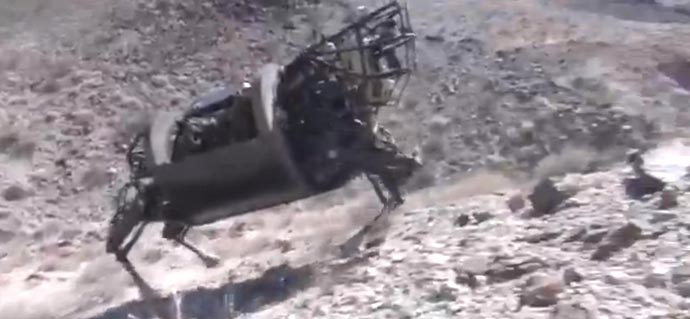No less dramatic-looking and menacing than the alien invaders imagined by science magazines of the 1950s, the autonomous robotic animals created by Boston Dynamics are being funded by the military, but might they one day take on a more benign role and offer an alternative to off-road cars and motorcycles?

Known as a Legged Squad Support System (LS3), the robotic horse is designed to travel 20 miles on rough terrain carrying a payload of 180 kg – more than enough for a rider and passenger.
The iron horse shares similar camera and scanning technology to the driverless cars being developed by numerous companies, including Google. In addition, the four-legged robot is equipped with gyroscopes to balance, resist attempts to push it over and right itself it falls.
Watch the robotic horse on YouTube
Horse vs tractor?
Almost 100 years after mounted cavalry was last used in conflict, the American army is considering a return to the horse, albeit a mechanised version that is stronger and less susceptible to attack than its living counterpart. No one expects a widespread return to the horse as a mode of personal transport, but how might it fare on one of today’s organic farms? According to the blog treehugger.com, through its combustion of fossil fuels a tractor emits 55 kg CO2 per acre compared to the 9.7 kg of indirect equivalent emissions from the horse.
If the horse feed was cultivated with the help of horses this quantity would be reduced.
Intensive farming demands the productivity of internal combustion engine tractors, but there is little reason why they cannot use recycled biodiesel to reduce their environmental impact.
Reduce the environmental impact of your driving
The most effective and immediate way to reduce the environmental impact of your driving is to do it less often; replacing a local trip with a journey on foot or by bike is ideal.
Even the breakdown cover you buy for your car, van or motorbike can help reduce your motoring emissions. The 5,000-strong fleet of recovery lorries used by the ETA operates 24/7, 365 days a year and is entirely carbon-neutral. Get an instant quote.
0 Comments View now